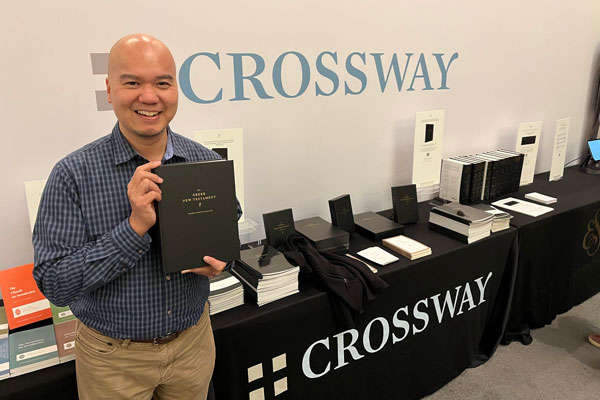Daniel K. Eng Presents a New Guided Annotating Edition of the Greek New Testament

Nov. 29, 2023
Daniel K. Eng, PhD, assistant professor of New Testament language and literature at Western Seminary, edited and contributed to a new reader's edition of the Greek New Testament released by Crossway. The Greek New Testament, Guided Annotating Edition allows readers to translate and annotate as they study. It also features biblical book introductions by Eng and other New Testament scholars.
Eng shared about his experiences working on this publication, how it is a helpful resource for students learning Greek, and why studying the biblical languages is worth the effort:
How is this Greek New Testament unique from other resources?
It’s a Greek New Testament for the purposes of reading and note-taking. With lots of white space in between lines and in the margins, it allows you to write your notes and annotations as you read the biblical text. Rare vocabulary is provided in the footnotes to save the reader time, and a glossary is provided in the back. All of this is in one volume, so that it replaces three books: (1) A Greek New Testament, (2) a journal/notebook, and (3) a Greek dictionary. On top of that, we’ve added value by having introductions to the Greek grammar and syntax of each New Testament book, written by some top scholars who serve the church. We include a list of recommended vocabulary for each NT book, some recommended further reading, and we show how this edition (produced at Tyndale House, Cambridge) is different from the other commonly-used editions of the Greek New Testament.
Who is the intended audience?
It’s the resource I wish I had when I was learning and practicing Greek. It’s for a Greek student or seminary graduate seeking to read the Greek text, with wise experts to guide you in reading each NT book. It’s one volume, so it’s easy to bring to a coffee shop or Bible study!
What was the editing process like for you?
It was a very edifying experience. I got to work together with outstanding Bible scholars, all of them followers of Jesus who love the church. I learned so much about the Greek text from their writing! Also, working with Crossway was fantastic—they have been professional and kind throughout the whole process.
What book introduction did you contribute?
I wrote the introduction to James. James, the brother of Jesus, wrote a letter urging followers of Jesus to persevere in our faithfulness, so we can receive approval and eternal reward from God when judgment comes in the end.
With all the resources and commentaries that exist today, why is it important for students to study the biblical languages?
Yes, we have outstanding resources today! Some of the best Greek and Hebrew scholars in the world have worked on our major translations, and we have a wealth of resources to help us understand the biblical text. But knowing and using the biblical languages help us to engage directly with the text and think critically about the commentaries and translations. It’s kind of like experiencing the Grand Canyon in person rather than seeing a video of it--we are not just taking what others have to say, but we are experiencing it directly. Studying the languages takes a lot of hard work, but it is definitely worth the effort.
For someone struggling to learn Greek, what advice would you give them?
First, don’t give up! Languages are hard work, but it’s very rewarding. No one’s language journey is completely smooth—there have been times that I’ve struggled with Greek. Hang in there, keep working hard, and you’ll be rewarded. Second, read Greek together with others! God’s word was always meant to be read in community, so we can encourage and sharpen one another. I structure our Greek class at Western Seminary as a supportive community, and I encourage everyone to find folks to journey together.